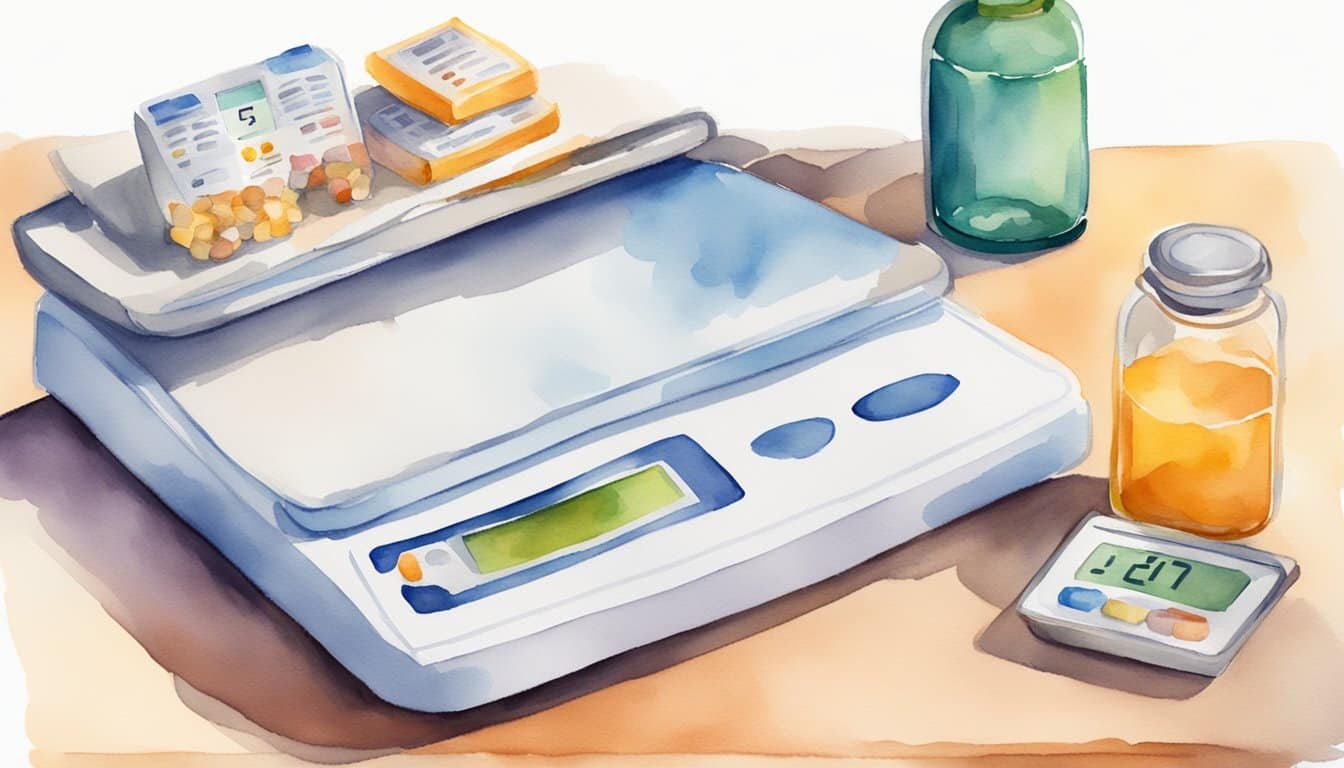Understanding Wegovy
Wegovy is a prescription drug that has gained attention for its role in weight management, particularly for individuals with obesity or those who are overweight.
What Is Wegovy?
Wegovy is a brand name for the prescription drug semaglutide, used in the treatment of obesity. As an FDA-approved medication, it caters to adults with a body mass index (BMI) of 30 or greater, or those with a BMI of 27 or greater with at least one weight-related condition, such as high blood pressure, type 2 diabetes, or high cholesterol. This medication is not meant for cosmetic weight loss or to replace a healthy diet and exercise.
How Wegovy Works
Wegovy works as a glucagon-like peptide-1 (GLP-1) receptor agonist. This means it mimics the GLP-1 hormone that targets areas in the brain which regulate appetite and food intake, leading to reduced hunger and calorie intake. Interestingly, Wegovy is administered through a subcutaneous injection once a week, which could influence its adoption by patients wary of needles. However, the promise of a significant reduction in body weight alongside lifestyle changes might outweigh the initial discomfort for those struggling with persistent obesity. Common side effects can include nausea and fatigue, but these are usually temporary as the body adjusts to the medication.
Assessing the Efficacy and Safety

Wegovy’s impact on chronic weight management has garnered attention, particularly for its potential in reducing body weight in adults classified as obese or overweight. This section explores the drug’s weight loss capabilities, data from clinical trials, and its safety profile.
Weight Loss Potential
Wegovy (semaglutide), utilized in conjunction with a reduced-calorie diet and increased physical activity, has been shown to aid in substantial weight loss. Adults with a body mass index (BMI) of 30 or higher, or 27 and above with at least one weight-related condition, have benefited from its ability to decrease body weight.
Clinical Trial Findings
STEP trials have provided critical evidence supporting Wegovy’s efficacy. A 44-week period study highlighted that participants experienced significant weight reduction compared to placebo groups, with the drug’s effectiveness as a weight loss treatment without negative implications for glucose metabolism.
Safety Profile
When considering the safety and tolerability of Wegovy, possible side effects such as increased heart rate and gastrointestinal disturbances have been noted. However, when prescribed according to FDA-approved indications, the drug demonstrates a safety profile well-aligned with chronic weight management objectives. Conditions like diabetic retinopathy were closely monitored during trials to assure comprehensive safety evaluations.
Understanding Side Effects

When considering Wegovy for weight loss, it’s crucial to be aware of potential side effects and understand how to manage them and recognize when medical help is needed.
Common Adverse Reactions
Side effects are an important consideration when starting Wegovy. Common adverse reactions reported by those taking Wegovy include:
- Nausea
- Diarrhea
- Vomiting
- Constipation
Other notable effects can involve headaches and heartburn. Less common but more serious side effects may involve gallbladder problems, including gallstones, and high blood pressure. For detailed experiences of side effects and statistics, see Embracing the Pros and Cons of the New Weight Loss Medications.
Managing Side Effects
Most side effects of Wegovy are mild to moderate and often decrease over time. Here are a few strategies for managing them:
- Stay hydrated to help ease constipation and headaches.
- Eat smaller, bland meals to combat nausea and vomiting.
- Consult with a healthcare provider about over-the-counter remedies for heartburn and other digestive issues.
Healthcare professionals can provide personalized advice for managing side effects effectively.
When to Seek Medical Attention
It’s imperative to seek medical attention for Wegovy-induced side effects if one experiences:
- Signs of pancreatitis such as severe abdominal pain.
- Symptoms of an allergic reaction, like trouble breathing or skin rash.
- Indications of more serious conditions such as medullary thyroid carcinoma or multiple endocrine neoplasia syndrome type 2, which include a new lump or swelling in the neck, trouble swallowing, or shortness of breath.
Patients with a personal or family history of thyroid cancer or kidney problems should discuss the risks with their doctor. As with any medication, a healthcare provider is the best source for guidance when serious side effects are suspected. For an in-depth look at rare but serious effects, review the case studies presented in Rare but Serious Adverse Effects.
Please note, while not common, long-term side effects including potential risks for depression, pancreatitis, and certain types of cancer are still under investigation.
The Role of Lifestyle Changes

When it comes to shedding pounds, individuals often think of weight loss medications like Wegovy as a magic bullet, but they can’t neglect the importance of lifestyle changes. These adjustments are pivotal to the success of any weight management strategy.
Diet and Nutrition
When they’re on a calorie meal plan, people should consider a diet rich in nutrients yet moderate in calories to support their weight loss journey. It involves a careful selection of foods that provide ample vitamins and minerals while controlling their food intake. Here’s a quick guide on how to balance their diet:
- Fruits and Veggies: Packed with fiber and essential nutrients.
- Lean Proteins: Important for satiety and muscle maintenance.
- Whole Grains: Better than refined grains for keeping one full.
- Healthy Fats: Found in nuts, seeds, and avocados, to name a few.
Incorporating a variety of food groups ensures they don’t miss out on key nutrients, all while aiding in gradual, sustainable weight loss.
Importance of Physical Activity
It’s no secret that exercise plays a crucial part in losing weight. Alongside a proper diet, engaging in regular physical activity can help turbocharge their metabolism and burn more calories. Whether they choose brisk walking, jogging, swimming, or cycling, consistency is key. They can aim for at least 150 minutes of moderate-intensity aerobic activity a week, but more can be even better. By bundling exercise with the use of weight management medications, they’re setting themselves up for a winning combo.
Practical Considerations for Wegovy

When considering Wegovy for weight loss, patients and healthcare providers need to weigh the practical aspects such as cost, how to use the medication, and what to expect with long-term treatment.
Insurance and Cost
Wegovy, being a relatively new prescription medication, might not be covered under all insurance plans. The cost without insurance can be significant, and it’s important to check with insurance providers to understand the coverage details. In some cases, Novo Nordisk, the manufacturer of Wegovy, may offer savings programs to help mitigate costs for eligible patients.
Dosing and Administration
Wegovy is administered as a subcutaneous injection once a week using an injection pen. The medication works by mimicking glucagon-like peptide-1 (GLP-1) which targets areas in the brain that regulate appetite and food intake. Patients are usually started on a lower dose, which is then gradually increased over time. Proper training on how to use the injection pen is crucial for safety and efficacy.
Long-Term Use and Maintenance
Long-term use of Wegovy for chronic weight management must be approached with a strategy for maintenance. It’s not just about losing excess weight; it’s also about maintaining a healthy weight and managing related health issues like type 2 diabetes and blood sugar levels. Some patients might experience side effects such as belching, runny nose, or sore throat. Regular follow-ups with healthcare providers are important to monitor any signs of hypoglycemia or other adverse reactions and to adjust dosing as necessary.

